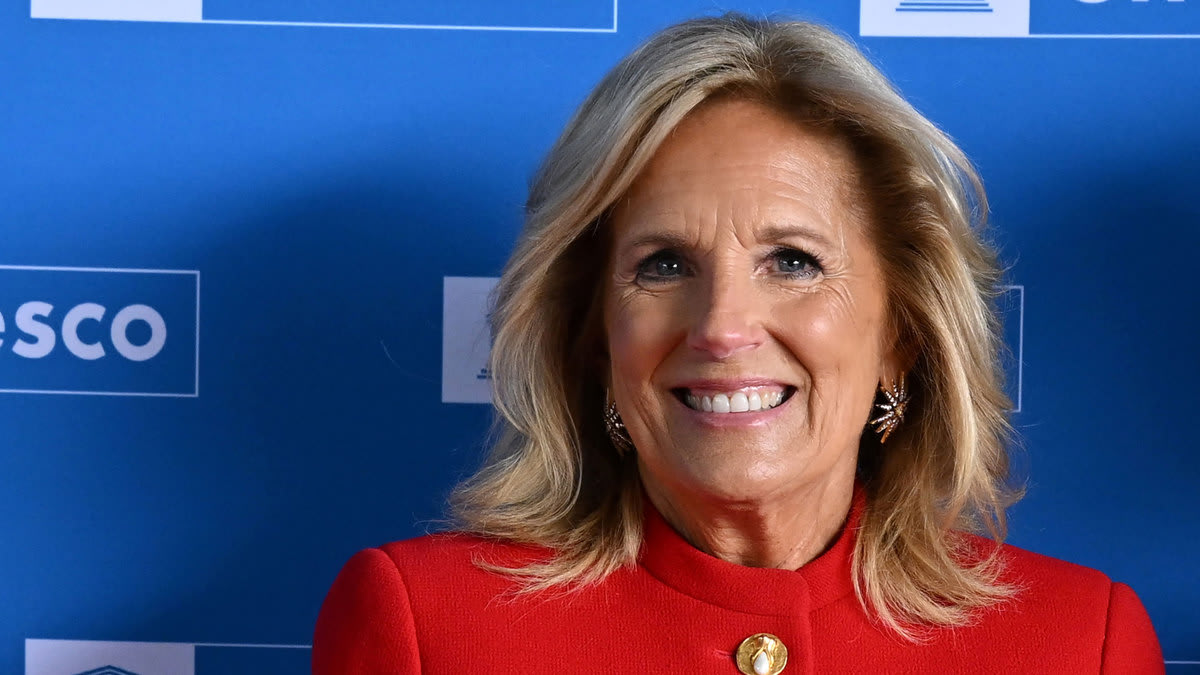Usually, a first lady looking radiant on the cover of Vogue is a PR coup for any presidential administration and a carefully-cultivated statement for a magazine that primarily covers fashion but also insists on its seriousness and depth.
There have been some huge, unenforced errors in first lady features–profiling Asma al-Assad as a cosmopolitan “rose in the desert” as her dictator husband slaughtered thousands of Syrian civilians may have been the biggest–but generally, respected first lady + tasteful Vogue treatment = mutually beneficial. And it would have been for first lady Jill Biden, who looks equal parts chic, powerful, and beatific in a Suffragette-white tuxedo dress in front of a cream-plaster backdrop, her name in font so large it is dwarfed only slightly by the Vogue logo, and augmented by a quote that was meant to be a feminist rallying cry: “We will decide our future.”
Except the cover dropped just days after her husband gave a debate performance so disastrous that there is widespread talk of replacing him on the ticket, and as Jill, Joe, and the Biden family gathered at Camp David to hash out next steps. “We will decide our future” suddenly takes on a different implication—not that voters generally and women specifically will decide the nation’s future, but that a small, tight-knit family will decide for the rest of us.
Jill Biden has largely been a well-liked and uncontroversial first lady, but in the aftermath of the debate and her family’s wagon-circling, she’s been under more scrutiny. And that scrutiny has expanded now to Vogue’s editor-in-chief Anna Wintour, who is a Biden friend and political donor.
Some conservatives have whined that Melania Trump was never given a Vogue cover while her husband was in office, while Jill Biden, Michelle Obama, and Laura Bush were all featured in the magazine (Melania did grace the cover when she married, but she was identified not by name, but as “Donald Trump’s New Bride”). Generally, the accusation seems to be that Wintour is playing favorites with Democrats because of her own political persuasions.
This is, of course, extremely silly from a variety of angles. Vogue is an aspirational magazine aimed at sophisticated, city-dwelling women who care about high-end fashion and lifestyle but also choose to read longer-form articles about politics and culture–not exactly Trump’s voter base, and not exactly a cohort that admires or aspires to be like Melania.
College-educated city women are more likely to vote Democratic than Republican. And these same women have vested personal interests in many of the matters the Democratic Party promotes and the anti-feminist Republican Party attacks, including access to abortion, contraception, and IVF, not to mention paid family leave, affordable childcare, and a general vision of women as free and independent.
Women’s magazines have a duty to inform their readers and to be fair to their subjects. But they also have a duty to be honest with their audiences about how elections and the winning party might impact their lives, and not just stick to shoes and handbags as some demand.
Vogue, like many women’s magazines, toes a careful line in its efforts to not alienate its readers, and can be cautious to the point of absurdity. The Jill Biden profile, for example, circles back to abortion rights again and again, and yet–not unlike Joe Biden–takes great pains to avoid actually using the word “abortion.” But it does need to maintain basic credibility with its readers, which is probably why an editor’s note was affixed to the top of the Jill Biden story with a quote from the first lady saying that she and Joe “will not let those 90 minutes define the four years he’s been president. We will continue to fight.” And President Biden “will always do what’s best for the country.”
This is surely not how the first lady nor the Vogue team wanted this to go. But spectacularly bad timing aside, the Vogue profile itself is worth a read. It paints a picture of a woman who is very comfortable as a supporter, whether that’s of her husband or her children and stepchildren or the hard-working students she teaches, and who is fiercely loyal to those she cares about (a long list), but is far less comfortable in the spotlight herself.
She keeps her own emotions to herself, instead absorbing the needs and reflecting back the desires of others. This is great on the campaign trail. It’s great for a political spouse. It seems less than ideal at this exact moment, when what the president needs is not unflagging support but very real talk from the person he trusts most.
It is asking too much, perhaps, to expect any wife to tell her husband that he should abandon a lifelong dream midway through. But if it’s actually true that, as Jill Biden tells Vogue, “We know what’s at stake” in this election, and that, as the Vogue reporter writes, “Jill Biden is very good at meeting a moment,” then those of us watching from the sidelines can at least hope that she steps out of her comfortable role as carer and supporter and into the very figure she cuts on the magazine’s cover: A woman donning the power color of America’s early feminists, confronting and pissing off a lot of the men around them.
If the Vogue cover is an embarrassment, the Bidens should reckon with why. And if they don’t want to broadcast to the American public that it is their family and their family alone who will decide our collective future, then the answer isn’t to hunker down, but to open up–even if it turns out that what the Democratic Party needs now is not what the Bidens want.





